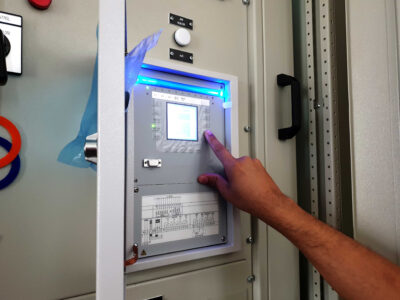Understanding Electrical Acceptance Testing
Filed under: Uncategorized
Comments: None
 When dealing with industrial electrical equipment, you understand how important it is to maintain each device so it functions safely. Whether you work with the equipment directly or if it is part of a system, understanding the process is fundamental to ensuring the safety, reliability, and lifespan of your electrical infrastructure.
When dealing with industrial electrical equipment, you understand how important it is to maintain each device so it functions safely. Whether you work with the equipment directly or if it is part of a system, understanding the process is fundamental to ensuring the safety, reliability, and lifespan of your electrical infrastructure.
What is Acceptance Testing and Why Does it Matter?
Acceptance testing is a systematic evaluation process conducted on newly installed or retrofitted electrical power equipment and systems. Its primary purpose is to verify that these systems adhere to design specifications, comply with applicable standards, and operate within safe and reliable parameters.
Essentially, it’s a litmus test that validates whether your electrical systems are ready to go. Much like a car going through quality checks before hitting the road, electrical systems have to undergo acceptance testing to guarantee their functionality and safety.
Why is Acceptance Testing Important?
This type of testing is the linchpin in the electrical system lifecycle. It helps prevent potential failures, ensures worker safety, and optimizes performance, leading to lower utility bills.
- Safety Assurance: Acceptance testing guarantees that your electrical systems are working within safety limits. It identifies potential hazards before your system gets up and running, preventing catastrophic failures that could lead to injuries or damage.
- Reliability Confirmation: This process ensures that your electrical systems perform within specified tolerances. It minimizes the risk of unexpected breakdowns, optimizing system reliability.
- Compliance with Standards: Acceptance testing ensures that your electrical systems align with design specifications and comply with industry standards.
Strategic Timing
Timing is key when it comes to acceptance testing. The tests should happen during new construction or when updates or changes are made to existing electrical equipment or system segments. This ensures a successful system rollout and reduces the risk of potential issues.
Types of Acceptance Testing
ANSI and NETA standards outline a range of tests to validate the functionality, quality, and safety of electrical systems. Some key types include:
- Visual and Mechanical Inspections: Examine the physical components to identify any visible issues or defects.
- High current testing: This examination evaluates the reliability of electrical devices, determining how much thermal energy they can withstand.
- Relay testing: Protective relays will trip a circuit breaker when a fault is detected. This examination scrutinizes a relay’s response times and its highest functional frequency.
- Power factor test: Power factor tests assess the integrity of component insulation and how well it withstands wear.
- Full electrical testing: This comprehensive test involves evaluating all aspects of an electrical device, with testing practices that are adjusted for each part. ANSI and NETA provide detailed requirements for this extensive examination.
The Benefits of Electrical Maintenance
While acceptance testing is vitally important, you cannot forget about ongoing electrical maintenance. It keeps your systems running safely, while simultaneously enhancing the longevity and performance of your systems.
Optimized Power Performance: Regular maintenance helps identify and address issues before they become major problems, saving money and time while ensuring optimal power performance.
Minimized Downtime: Preventive maintenance reduces the risk of unexpected breakdowns, minimizing downtime and maximizing the productivity of your operations.
Extended Equipment Life: Proactive maintenance measures, informed by your system’s acceptance testing results, contribute to extending the useful life of electrical assets.
Acceptance testing is the cornerstone of a robust electrical system. Its role in ensuring safety, reliability, and compliance cannot be overstated. Although it is often a regulatory requirement, it’s also safe to think of it as a proactive measure for your company.
Whether you’re a seasoned pro or you’re still looking up “what is acceptance testing?” trust North Central Electric. Our team of certified technicians and field experts is ready to ensure your electrical systems are not just compliant but optimized for peak performance.
Ready to secure the reliability of your electrical infrastructure? Contact North Central Electric today for tailored electrical testing solutions that prioritize safety, reliability, and efficiency.
